These days Katy Davidson finds solace within her budding career in commercial music production while being peacefully nested in the heart of Joshua Tree. I offer up my upmost jealousy within her arrangements during our phone conversation. Davidson carefully follows up by saying that she is indeed fortunate to be in the location she calls home, despite the most recent wildfires engulfing parts of California. Fortunately for Davidson, she informs me that a portion of the fires are fifty miles away from her residence.
Davidson’s musical moniker Dear Nora is imprinted within the swell of noteworthy indie rock acts that have emerged from the Pacific Northwest dating back in the late ‘90s. During that time, many remember bands such Bikini Kill and Sleater-Kinney generating the arrival of the riot grrl movement to which captivated many around the world. Other acts such as singer/songwriter Elliott Smith moved us to explore deep within our own emotional journey. Die-hard music fans looked towards the Pacific Northwest to obtain music that was utterly authentic at that time.
Dear Nora leaped into the indie scene with a concoction of intoxicating guitar riffs, angst-riddled vocals. One could say that you catch the band’s adoration to pop while mixing folk, rock to their songs. The lyrics were significant in the way that they were relatable to many. Who hasn’t struggled with the dealings of rejection, self-doubt, and grasping hold on transition yet being hyper aware that the jaunt of being young is peppered with an unforgettable time? That is what awaited listeners to Dear Nora to which in part made individuals like yours truly become lifelong fans. Dear Nora has mutated into a variety of lineups throughout the years, often at times being Davidson performing solo. Being shelved after a tour in 2008, they found new life after the re-release of Mountain Rock on vinyl. Dear Nora went on to release a new album titled Skulls Example along with a career-sprawling introspective set title Three States: Rarities 1997-2007.
Earlier this month, Dear Nora re-released the box set to include a booklet written by them. Within the booklet, Davidson broke down the history of the band in compelling form. Side A offers up the origins of how the band became to be; Side B gives readers a glimpse of what touring was like for Dear Nora (which at one point included being crammed in a 1981 Toyota Corolla); Side C details the early stages of the 2000s, which entails a tour stop in Tokyo worth reading; Side D is mostly stories about tracks didn’t never quite fit previous albums; Davidson describes adventures in Europe in Side E; Side F is snippets regarding writing for Mountain Rock and final remarks.
What made you fall in love with music growing up? I like to ask this question because I’m always interested in hearing the response.
You know, it’s kind of amazing to try and find the source of that because it happens when you’re so young. One thing I’ll say is that, and then maybe there’s something that has something to do with it, is that my dad’s a musician. My mom was an actress and she acted on a lot of things in physical theater so music was definitely in my home.
Moving on from there. I don’t even know how it happened. It just feel like it happens so organically when you’re at that age. And then, of course, there wasn’t the internet because we’re talking about like early eighties. So in whatever way I had access to a radio, I just got a friggin obsess. I literally would sit by the radio and listen to pop music. Then I was given a little stereo from my parents and I would record the radio station and play the tapes back later. I was so into eighties pop music in the deep, deep way from a pretty young age, just because I had access to a radio. For whatever reason, I figured out that I could turn it on and play songs on it.
Then happening simultaneously to that was my parents gave me one of those like plastic Fisher-Price record players. They’re like, here’s our record collection have at it. I didn’t feel like I had access to my dad’s most prized records. I think I was more digging into my mom’s records. She was like a sixties pop nerd, so I was digging really hard into like Beatles. When I was seven, eight, nine years old, I was like digging so hard on the Beatles discography and like just getting into Madonna, Cyndi Lauper prints.
I could see that as far as those acts being influences when I listen to your music, especially with Madonna. She had an edge to her in those early days that incorporated some punk to her delivery.
Yeah, and I would say the thread in a deep, deep way was melody. You know with all that music is just like that. Cyndi Lauper…I mean, she’s so unusual. It’s just like beautiful pop melodies and then throws the Beatles on top of that. I think I was very influenced by that.
Were you living in Portland at that time or were living in Arizona?
I was born and raised in Arizona. I didn’t move to Portland till I was seventeen going on eighteen. I went to Lewis and Clark College and moved there from Arizona.
When did it start becoming clear that you wanted to start performing music? Was it when you were living in Portland?
I think I daydreamed about it as a kid. I would borrow my dad’s electric guitar and I would make my sister take pictures of me posing with it before I could even play it. I would come up with fake bands that I was in my head. That was before I could even play music because I was so obsessed, of course. Then I would play…I was like one of those classic high school kids, the door closed on my room at all times, listening to music nonstop, and just playing guitar nonstop.
There’s this like beautiful catalyst, right? Because the vision is there, but you don’t know how to make it come to fruition. I got to college and was around all these other young people who had all these different types of relationships, only listening to music or wanting to live music but actually writing their songs. I just thought it was just so eye and mind-opening all at once. I was like, oh, this can be done. It’s not just this thing you have to daydream about. This is actually happening, and I can do it. It was a bit mind-blowing.
Did you find yourself going into the city and going to clubs to see music?
No, not really at all. We were nerds…our college was in the suburbs in a beautiful forest. Not right near ugly weird strip mall suburbs, but you know, we were tucked away in a nice part of Portland and it never even occurs to us to like go to shows in Portland. If we did anything off-campus, we would like to go deeper into the suburbs and like, go see a Hollywood movie. The city was almost kind of not real anyway.
I think pretty much right upon graduation, our friends started living in Portland and we started to do more, but this was a solid three years. We were deeply insular, and we just didn’t really leave campus or do anything except for sort of hang out.
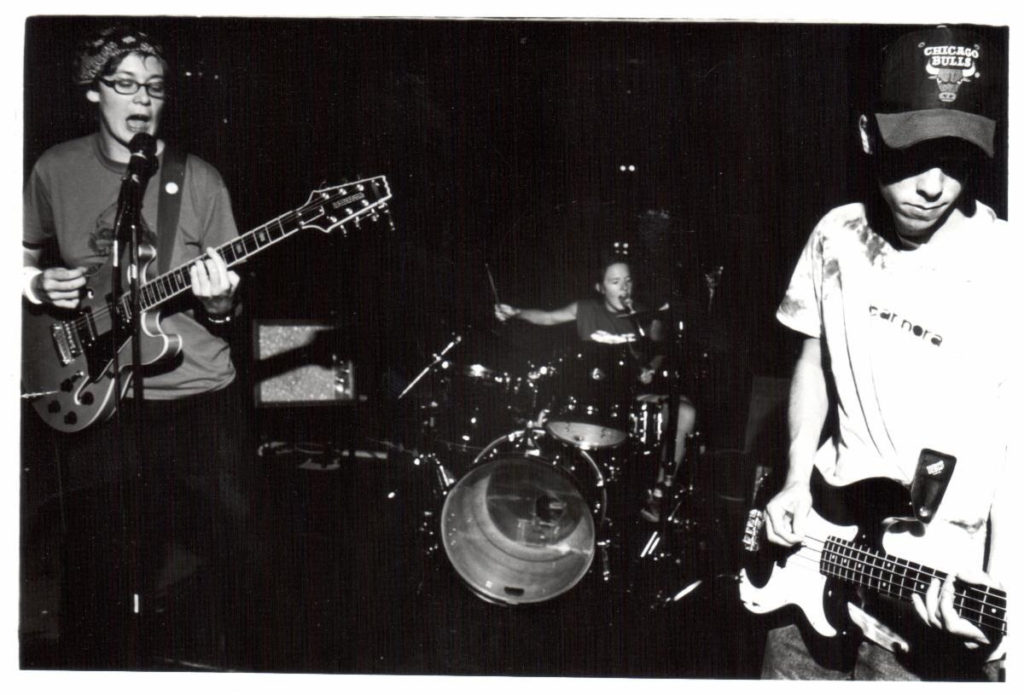
When did the moniker Dear Nora start to take form into being a band? Was it after graduation?
Yeah, but not long after. That must’ve been I think in ’99 when we came up with the band name, but we, you know the three members that were the first members of Dear Nora. We’ve been playing together for several years at that point but just really informally.
This is how like all life things happen, right? It’s just like one thing kicks off this whole domino effect. So the gist is I moved into a house that the main person who lived in the house was Kurt from Magic Marker Records. So much happened after that happened. We met other bands on the label. We met the bands they knew on different labels. They helped us go on tours. Suddenly they wanted to put out a seven inch. I just moved in there because they had an extra room and I heard about it, you know?!
It’s funny to hear that you had no idea what you were getting yourself into when moving in.
All we knew is that we liked playing music and liked having, and like having fun. And that’s basically it. Then suddenly we’re like oh, we can have a band, like a band?! We could go on tour?! Oh, you’re you want to put out a seven inch?! I don’t even know what that is. Like, tell me. And we knew indie music; we grew up in high school listening to Guided By Voices and Liz Phair. Just having these types of musicians be in a smaller scene and becoming suddenly accessible to open a lot.
You stopped going under the moniker Dear Nora for an extended period for time. What led you to choose to do so?
I was entering my late twenties and just really broke, I was really confused about the directions I wanted my life to take. It was just like, at that point music making I guess even under that name or almost at all was sort of like completely thrown into question. I just needed to get my shit together. I needed to grow up. So I just that I wasn’t just I stopped doing that and went under a different band name, you know. I had to make a ton of different life changes to like, not drive myself deeper into a hole.
I have read that many music lovers still discover Dear Nora after all these years. One album in particular that was successful was the vinyl re-release of Mountain Rock. What feedback have you heard?
You know, for me, I do think Mountain Rock is probably the best Dear Nora album before Skulls Example. So yeah, it makes me happy. I’m glad people are finding that one.
Do you feel like that Mountain Rock was the album one that catapulted everything for you, in many ways?
I don’t know if I’m going to do a good job about putting this to words, but something was happening during the making of that one. I just don’t know how to explain it otherwise. I think that I was tapping into some deeper frequencies that I haven’t tapped into before. I don’t know exactly how or what caused it that but I on some level – and don’t take this too literally please, including anyone who’s reading that who might read this – I think on one level I was like communicating with like God, or like a higher power or something. Something was at play at that time and I don’t know exactly what. It might just be that I was getting older or maybe it was a confluence of different life events. But something helped me like have a grander vision with that one.
Maybe it wasn’t something you weren’t supposed to know at the end of the day.
I do think that for whatever reason was going on in my life around that time, be it like I had just flown home from a tour in Europe and I did a bunch of traveling on my own, and especially for being still relatively young, I was able to zoom out a little bit and get some pretty cool perspective. I think you hear that in that album now.
Did tapping into that self-discovery help you through the other albums, especially with Skulls Example?
With Skulls Example, I think on some level, I was able to tap into that and I was able almost to recreate that experience, but it was almost like a simulation of that experience. One of the things that might surprise people and even surprises me is that I had a really hard time making Skulls Example. It might be that I have a full-time job. I really loved making Skulls Example, and I love how it came out. I do think there’s something special to it for sure, whereas making Mountain Rock felt like I tapped into a divine place.
Did you feel any urgency to write and record Skulls Example with the wildly popular re-release of Mountain Rock on vinyl?
No, no, I wanted to put out Skulls Example. I knew that I had things to say. I knew I had been sitting on some good songs that eventually ended up on that album. I’m so glad that I did. I loved the way that it turned out. It might be a better album than Mountain Rock in some ways.
Getting back to doing work under the Dear Nora moniker once again, I read that you also became inspired again after purchasing a four-track.
Yeah, one of the things that did help me sort of form this bridge between old Dear Nora and new Dear Nora is that my friend sold me a Tascam four-track that had been just sitting on a shelf in her house. I had used Ableton Live for several years. I used it a lot with Skulls but basically all the songs started on a four-track and dump the stems into Ableton and play with them more. That I do think allowed me to sort of tap back into what I was trying to do with your original Dear Nora.
Were you apprehensive at any point when getting back to writing music for Dear Nora?
No, not apprehensive. I mean, honestly, it was, even though I said it was kind of hard to do just in terms of like the work that I had to put into it, it was just honestly fun like this. It was cool to know that I was going to make something that people would hear and that I could continue sort of what I started in my twenties.
Your question reminded me that I think it is fascinating, and I still don’t know how to square this with my brain because I don’t listen to rock music anymore. I don’t listen to folk music. I mean, maybe a tiny bit. Like I, you know, I still love like my Johnny Mitchell discography, Bob Dylan, what have you. On a daily basis, I listen to like pop and hip-hop. I’ve gone full circle for when I was like eight (laughs).
How mentally strenuous was it for you to lock down what songs would make up Three States?
That was during the financial crisis of 2008, and I had just been laid off from the job I had back then. Unlike some of these other projects, I actually had time.
Half of the compilation was easy to decide because it had been things that have had come out either on seven inches or from co random, like label comps. That was easy to figure out then. The whole second half is like just a lot of unreleased things like things I recorded for both Mountain Rock and There Is No Home. You know, a good third or two, almost half of Three States are outtakes from those two albums. It was hard. Like I had to mix a bunch of things down from cassette tapes so it was like logistically demanding.
What was that experience like for you writing the booklet for the re-issue of Three States?
It was a kind of like making Skulls Example: very hard and very rewarding. Like I was banging my head against the wall, writing this stuff. But on the other hand, I’m glad I did. I like what I wrote. I think I tried to tell my truth about making music in the late nineties and early two-thousands. I tried to tell my truth about being in my twenties and what it’s like to have a band and the ups and downs of that. The booklet is kind of a jam. Like that’s the fresh material right there.
How long did it take it to write the booklet?
I think I did it slowly over the course of, I don’t know, a month or something. The other thing about writing the booklet was I was writing about the past who likes to sit around and reminisce a lot, even though we have amazing memories and stories. So it’s just straight up hard to be like, you need to think about the past all this month, and you need to write it down and say something meaningful about it. It’s difficult.
Are you currently writing anything?
Yeah. Yeah. I am very slowly. I’ve got like drafts for like twenty, twenty-five songs. At least half of it’s pretty good, so I’ll do something with it someday.
After all these years, you still excited about creating music?
Sort of (laughs). I know it sounds like funny to say no. I think when I’m able to get into the zone and I’m flowing, I enjoy it. I told you I work as a music producer, and I produce other composers. Now I find a lot of joy in that. I love being the creative director and like, cokes really cool performances out of others. It’s incredibly rewarding for me to be a producer. I’m almost more drawn to it at this point, but I also feel like I do have these good songs and I need to do something with them at some point. I’ll slowly chip away at it; eventually I will get it done.


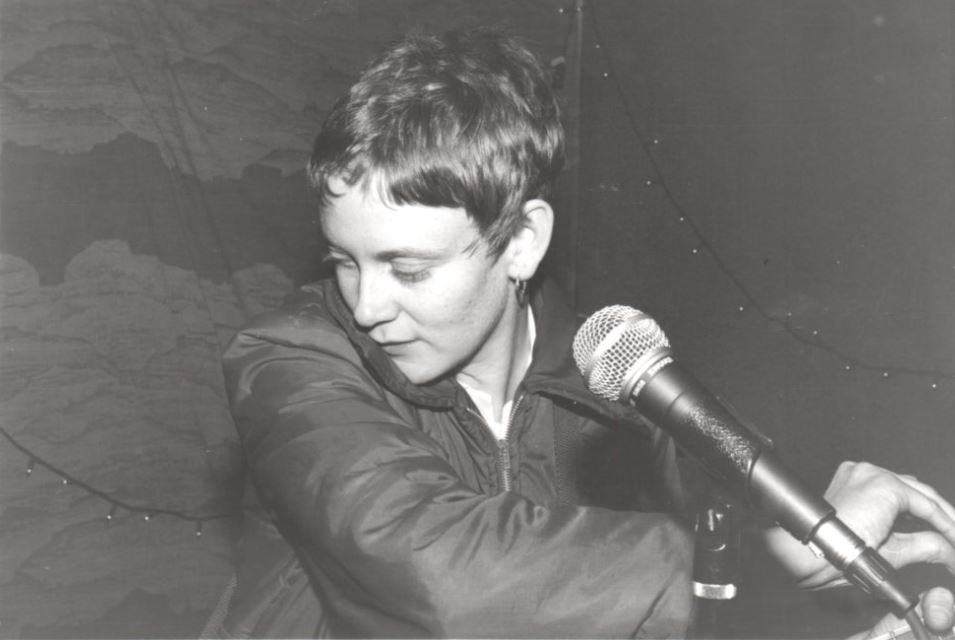
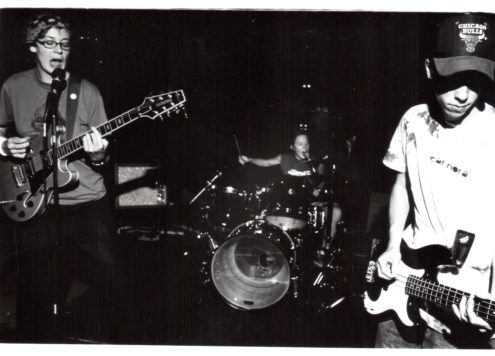

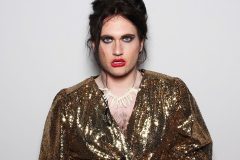
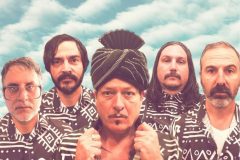
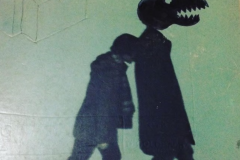
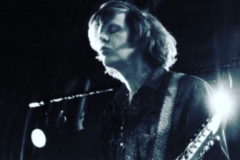

Social Media